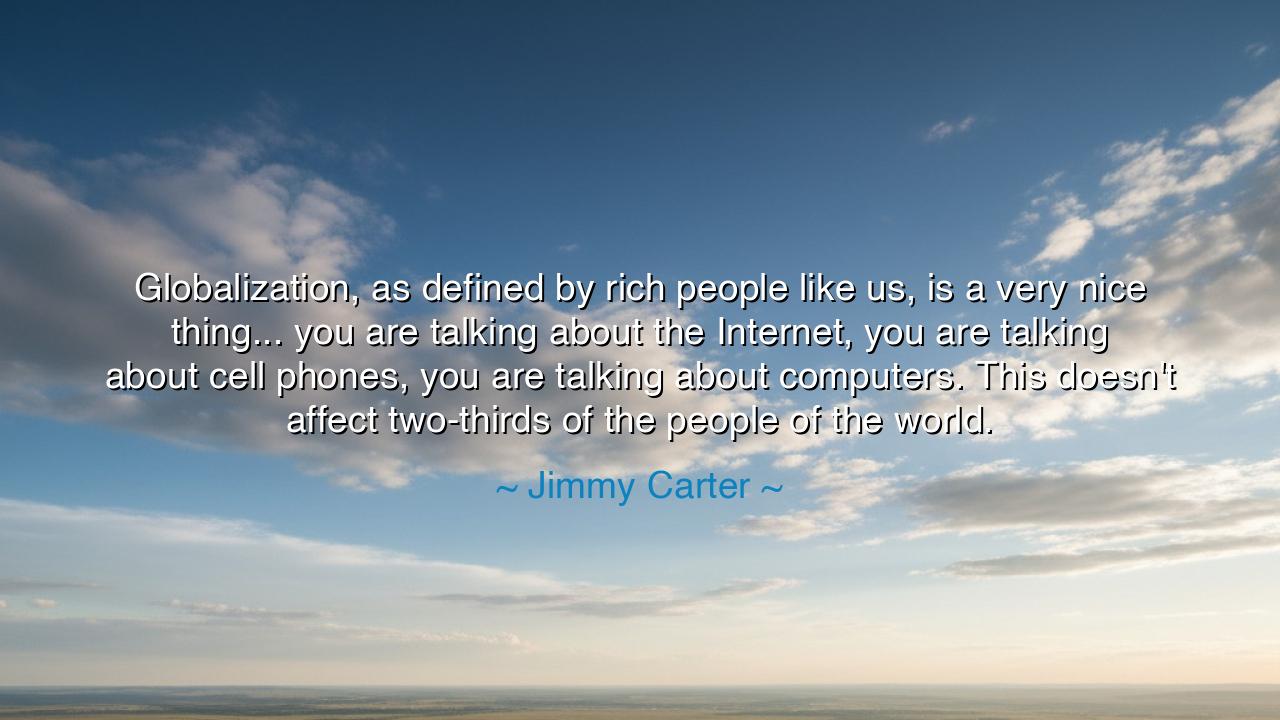
Globalization, as defined by rich people like us, is a very nice
Globalization, as defined by rich people like us, is a very nice thing... you are talking about the Internet, you are talking about cell phones, you are talking about computers. This doesn't affect two-thirds of the people of the world.






In the vast sweep of human history, we have witnessed the rise of empires, the spread of ideas, and the movement of people across the globe. Yet, as Jimmy Carter so wisely points out, "Globalization, as defined by rich people like us, is a very nice thing... you are talking about the Internet, you are talking about cell phones, you are talking about computers. This doesn't affect two-thirds of the people of the world." These words carry with them a sobering truth—one that forces us to confront the reality of inequality in the modern age. While the world becomes more connected, more interdependent, there remains a vast swath of humanity untouched by the advances that we, in the developed world, so often take for granted.
In ancient times, the concept of the “global village” would have been beyond comprehension. The people of the ancient world were bound to their lands, their empires, and their cities. Trade routes existed, yes, but the vast majority of people lived in relative isolation. The ancient Romans, for example, were masters of roads and infrastructure, connecting their empire through a vast network of routes, yet their conception of the world was limited to the bounds of the empire. In such a world, wealth and progress were often reserved for the elite, while the common people lived without the benefits of the luxuries we know today. In many ways, the challenges of our modern globalization are echoes of these ancient inequalities, where progress is experienced differently depending on one's position in the world.
When Carter speaks of globalization, he is not simply referring to the marvels of modern technology that have reshaped our daily lives. He is urging us to see the truth that, while these tools may offer unprecedented opportunity and connection, they remain inaccessible to a significant portion of the global population. Consider the example of rural India, where millions still live without access to reliable electricity, let alone the Internet. For these individuals, the smartphones and computers that we use as tools for business, education, and communication are distant dreams, not everyday tools. While the world around us grows more connected, for many, it remains a world of isolation and disconnection, a stark reminder of the deep gaps in opportunity.
In the ancient world, it was often the kings and philosophers who lived in the most opulent conditions, enjoying the fruits of conquest, trade, and knowledge. For example, Alexander the Great, in his quest to conquer the known world, spread Greek culture across vast regions, leaving behind cities filled with temples, libraries, and great works of art. Yet, even as Alexander and his elite enjoyed the riches of conquest, the common people in his empire were left to toil, often unaware of the transformations taking place around them. The same can be said today. The wealthy elite, those who control the means of technology, can use it to amplify their influence and wealth, while the vast majority of the world remains without access to these tools.
The lesson here is one of awareness and responsibility. Carter’s words are not a call to reject globalization, but rather a plea to acknowledge the disparities that lie at its heart. We must recognize that while the world is indeed becoming more connected, this connection is not universal. As we enjoy the privileges that globalization offers, we must also remember those who remain on the margins, those who have yet to experience the benefits of this interconnected world. It is not enough to simply celebrate progress; we must ensure that progress reaches everyone, regardless of their geography, their economic status, or their access to resources.
History offers us many examples of leaders who, despite their great power and influence, sought to bridge the gap between the privileged and the marginalized. Mahatma Gandhi, for instance, was not only a political leader but a spiritual force who advocated for the rights of the untouchables in India, the poorest and most disenfranchised members of society. His life was a reminder that true greatness is not achieved by the accumulation of wealth or power, but by the service and upliftment of the weakest among us. In the same way, Carter’s reflection urges us to use our own privileges—whether in technology, wealth, or position—to help elevate those who are left behind in the wake of modern progress.
The practical actions we must take are simple yet powerful. We must first acknowledge the unequal distribution of the fruits of globalization, and then work to change it. This can be done through education, by ensuring that technology and information reach the most remote parts of the world. We must advocate for policies that connect the disconnected, providing access to education, healthcare, and technology for those who are currently excluded from the global conversation. We must also support businesses and initiatives that are working to create a more equitable world, where globalization is not just a privilege for the few, but a shared opportunity for all.
Carter’s words are a call to action and a reminder that progress without equity is incomplete. As we move forward into this new era of globalization, let us strive to ensure that it is not merely a story of advancement for the few, but a shared journey where every person, regardless of their origin, has the chance to participate and prosper. It is in this pursuit of true global unity, where all are given the tools to succeed, that we will find the true meaning of progress.






AAdministratorAdministrator
Welcome, honored guests. Please leave a comment, we will respond soon